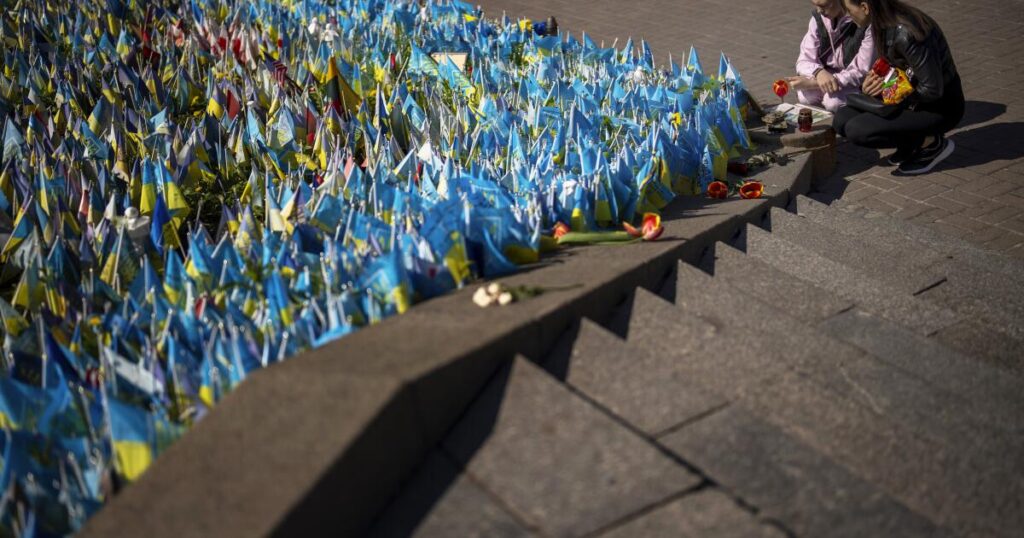Kiev, Ukraine —
It appears to be a video shot on a cell phone from an apartment window, as the camera pans across a row of cars parked on the road below, and it takes us a minute or so to work out what we're looking at.
Then a funeral procession comes into view. About 50 people walk slowly behind a coffin draped with a Ukrainian flag. The camera widens to show cars traveling the opposite direction on an eight-lane highway stopping and people getting out. A few people stand solemnly as the funeral procession passes by. Most kneel on the asphalt, heads bowed in respect.
A social media post titled “Funeral of the defender who died today in Kiev” saw nearly 1,000 viewers react with comments and emojis, the most common being “Heroyam slava” (Glory to the heroes).
Memorial Day in the United States was established to honor those who died in the Civil War. Nowadays, Americans play “Taps” and place flowers on the graves of those who died in many wars. All of this is in the past. Here in Ukraine, people can only dream of the day when flag-draped funerals will end and the war will be a distant memory commemorated by a peaceful country.
More than two years after the Russian invasion in February 2022, Ukrainians are tired. The war is not going well. Many of Ukraine's friends abroad, especially in the United States, seem to have lost interest. A March 2024 survey found that more than two-thirds of Ukrainians have close friends or relatives who are serving or have served on the front line, and with the death toll running into the tens of thousands, too many have lost someone. So maybe it's no wonder that enthusiasm and passion have waned in 2022.
The most visible sign is that in contrast to the first days of the war, when thousands of people flocked to recruitment centers and often waited more than 12 hours to get a gun and a uniform, the army is now struggling to recruit new fighters and soldiers are suffering because of it – one of Russia's main advantages on the battlefield.
And yet, even though many of us are exhausted and discouraged, Ukrainians have not lost their respect for sacrifice and honor – in fact, the topic seems to come up in some form in almost every conversation.
Some of my friends, civilians who have never served in the military, argue that we are all making sacrifices just by staying in Ukraine: after all, about 16 percent of Ukraine's population – some 6.4 million people – remain outside the country, and those who are here pay a price every day.
“I could have been going to graduate school in Europe,” said one young civil servant who asked not to be named, “but instead I'm sitting in the dark with no running water or way to heat food, waiting for the next air warning siren that tells me a ballistic missile is heading our way.”
Some disagree that heroism is necessary for civilian lives. “The only ones who are sacrificed are those who risk and sacrifice their lives,” argues Albina Seliutina, 33, an economics researcher. “I can't compare myself to them.” But her sense of duty is unmistakable: “This is my country, my family, and I'm not going to abandon them just because the situation is tough.”
In fact, a recent poll found that 83 percent of Ukrainians still donate or volunteer regularly, often to support the military. Every company seems to have a fund and every social media channel posts daily calls for donations.
Students are also finding ways to donate. One student is trying to give a few hryvnia every time he's asked. “I don't want to be the guy who ignores requests for donations,” he told me. Others are donating regularly. One volunteers at a clinic every three weeks, while another spends a few thousand dollars every two months to buy a drone for a friend on the front line.
Soldiers have mixed feelings about the growing reluctance to enlist. Some are bitter. Valery Shirokov, 47, an infantryman and mortar gunner who volunteered in 2022 and saw action in the bloody Battle of Bakhmut, among other battles, uses the word “disheartened,” but his demeanor suggests a stronger emotion. “I don't talk to my friends who aren't serving anymore,” he tells me. “I can't stand being with them.”
Yevhen Shulamkov, 46, who was recently wounded in fighting near Shashiv Yar, feels more confused than angry. “I'm not in the habit of criticizing others,” he explained in a Zoom call from the hospital where he is recovering. “But I can't understand the feelings of those who stand by and watch. It's like when you see someone on the street who is injured or in danger. Who wouldn't stop and help?” He will spend another month in hospital, then return to the front line to rejoin his unit.
Many in and out of the military believe that more soldiers would enlist if the war went well. “If we had enough ammunition, if we felt the West was on our side, things would be different,” one friend explained. “Nobody wants to be Europe's meat shield. Nobody wants to die if we can't win.”
Maybe, maybe not. But it's not like Vietnam-era America or late World War I Europe. Elite units that promise skilled commanders and adequate training have no trouble recruiting; the legendary Azov Battalion is said to attract more volunteers than it can accommodate. And it's not hard to sense that most of my male friends who haven't served are racked with guilt, whether consciously or unconsciously.
“We know what this fight is for,” a civil servant friend reminded me, “and everyone understands what sacrifices they are making, no matter how big or small. Our lives and our existence as free Ukrainians are at stake.”
Tamar Yakoby is director of the New Ukraine project at the Kyiv-based Progressive Policy Institute.



